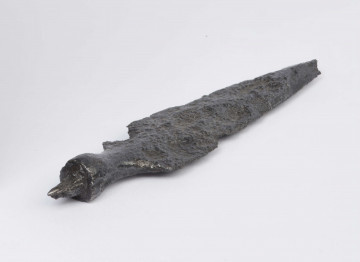
Arrowhead
476 — 1100
National Museum in Lublin
Part of the collection: Set of archaeological relics found in the Lublin Region
An iron arrowhead, found on the Castle Hill in Lublin during archaeological excavations in 1969.
The iron arrowhead has two burrs and a short sleeve. Its length must have been originally longer. It is rhomboidal in cross-section, sharply pointed, slightly tapered in the central part.
Arrowheads for bows and crossbows are the most numerous and varied category of medieval militaria. The most frequently found arrowheads were made of iron. They can be equipped with pins or sleeves, in which a wooden shaft was fixed (radius, arrow shaft). The latter are more characteristic of western Slavs, including Poland. The making of the sleeve was a complicated operation, because the arrowhead had to be symmetrical and well balanced. The crossbow and bow belong to the group of throwing weapons, popular in the Middle Ages.
Numerous militaria discovered on the strongholds of the Lublin region, including the Lublin Castle Hill, are the remains of internal struggles and external interventions, which took place in the 11th-13th centuries on the Polish-Ruthenian borderland. On the Castle Hill most of these finds were recorded in the archaeological excavations near the residential and defensive tower, the so-called keep.
Author / creator
Dimensions
cały obiekt: height: 3,6 cm
Object type
weapon
Technique
forging
Material
iron
Creation time / dating
Creation / finding place
Owner
The National Museum in Lublin
Identification number
Location / status